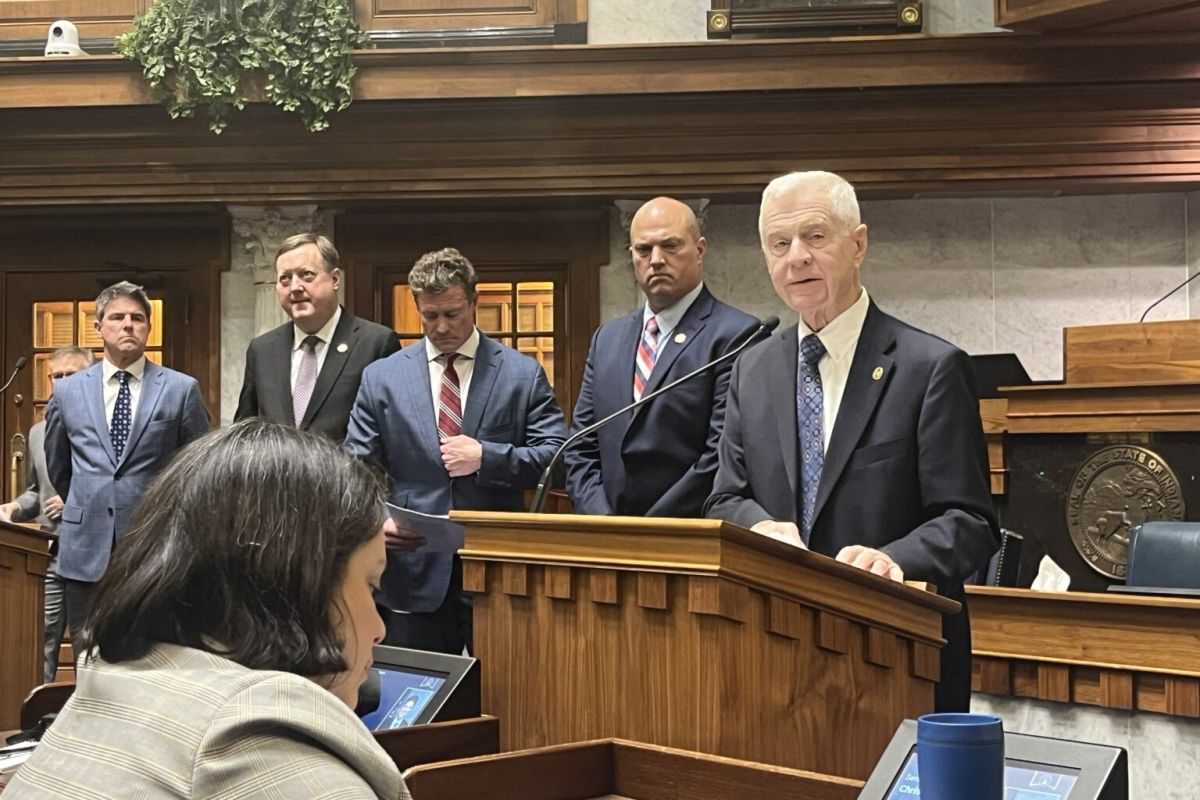
Sen. Ed Charbonneau, R-Valparaiso, and other members of the Senate Republican caucus at an agenda press conference on jan. 11, 2024. (Whitney Downard/Indiana Capital Chronicle)
A bill to require earlier interventions for students struggling with literacy is top-of-list for Indiana Senate Republicans, who unveiled the 2024 agenda Thursday morning.
Senate Bill 1, authored by Sen. Linda Rogers, R-Granger, would require IREAD testing to begin a year earlier, in second grade, and allow those who pass at that stage to be exempt from taking the test again in the future.
Students who do not pass must receive targeted support during third grade to help them improve their reading skills. After a full year of remediation — and three chances to take the IREAD test — lawmakers want schools to retain students who do not pass the test by the end of third grade.
Exceptions are carved out for students who have been retained in third grade before, special-education students, certain English language learners, and students who pass the math portion of the statewide assessment and receive remedial reading instruction.
Indiana third graders who fail the statewide reading exam can already be held back, but deciding how to implement the state policy is ultimately left up to schools.
Test data show that in 2023, 13,840 third-graders did not pass IREAD. Of those, 5,503 received an exemption and 8,337 did not. Of those without an exemption, 95% moved onto 4th grade while only 412 were retained.
Rogers’ bill could cause more students to repeat third grade even though the bill’s wording is almost identical to existing rules. Legislative staff said that by putting retention language in state law — rather than just an administrative rule, where it’s currently housed — schools are expected to comply.
“This is not a retention bill. Retention is the absolute last resort, after we’ve exhausted all other methods to help struggling student readers,” said Sen. Jeff Raatz, R-Richmond, during the Senate GOP agenda release. “There are a lot of good things the General Assembly (wants to provide) to help kids learn to read. We’re going to catch them early, and give those who need it extra support so they can be successful.”
“When you look at everything we’re doing for students in Indiana, it’s all hands on deck to make sure that kids can read by the time they finish third grade,” he continued.
The priority measure is a response to Indiana’s dismal literacy rates. The latest reading scores showed that one in five Hoosier third graders failed state-standardized IREAD testing and continue to struggle with foundational reading skills.
An answer to Indiana’s literacy ‘crisis’
Indiana’s existing third grade reading policy was adopted in 2012 by the State Board of Education. The administrative rule mandates that kids who fail the third-grade literacy test should be held back. Exemptions exist for students in special education, certain English language learners and students who have already been retained twice or more.
The retention provision in Rogers’ bill mirrors that of the current rule but adds a new exception for students who pass the ILEARN math exam in third grade. Indiana Department of Education (IDOE) data indicates there were 583 such students in 2023.

The GOP-backed legislation additionally mandates summer school to be offered to students who are not reading proficient in third grade — or are at-risk second graders behind in literacy. Language in the bill does not require students to actually attend or participate in summer school, however.
Indiana Secretary of Education Katie Jenner and Gov. Eric Holcomb said earlier this week they want required IREAD testing in second grade, too. Doing so could help teachers and parents better identify struggling students and implement additional support before kids get too far behind, Jenner said.
Holcomb’s goal is that 95% of students in third grade can read proficiently by 2027.
Jenner has repeatedly emphasized the need for more literacy catch-up to take place over the summer.
Funding for summer school — equal to about $18.6 million per year under the current state budget — is mostly going toward students taking physical education and health courses in the summer. Jenner said the state should now shift the focus of summer school to reading.
Rogers’ bill answers that call, requiring the State Board of Education to adopt rules that will change the distribution formula to prioritize reading-focused summer school programming for second and third graders.
And although Jenner, Holcomb and Republican state legislative leaders have said before that high rates of absenteeism are likely contributing to the state’s dismal literacy rates, policy to address student attendance and chronic absenteeism is not included in their agendas.
The latest Indiana data shows that about 40% of students statewide missed 10 or more school days last year, and nearly one in five were “chronically absent” for at least 18 days.
Senate Pro Tem Rodric Bray, R-Martinville, said Indiana already has “a pretty decent system” for dealing with chronic absences, and said parents, schools and law enforcement need to weigh in on potential new approaches to absenteeism and truancy.
Still, he said the issue is “super important,” and promised “a full vetting this year to try and get something done.”
Other priorities for child care, health
Outside of education, Senate Republicans also targeted regulations in the child care industry they claim are hampering accessibility.
Much of the bill’s contents are recommendations from an interim committee, said author Sen. Ed Charbonneau, R-Valparaiso, such as establishing pilot “micro-facilities” and lowering the minimum age for child care workers.
However, the bill will only prioritize recommendations that don’t have a price tag.
“2024 is not a budget year. But do we sit around and do nothing because we have no money? No,” Charbonneau said. “This gives us an opportunity to kind of dive in and look at the issues that normally we might not look at because we have money.”
Another measure to reduce government regulations, fines and fees comes from Sen. Chris Garten, R-Charlestown. Senate Bill 4 sets up an ongoing review process of unused state government funds and allow agencies to cut their fines or fees through an internal process.
Garten estimated that the bill could recoup roughly $40 million in its first review cycle, with over half of that money earmarked for the Medicaid reserve account to make up for a $1 billion budget shortfall and the remainder going into the General Fund for spending in 2025.
Sen. Eric Koch, R-Bedford, painted his bill on lead service lines as a health issue, saying that utilities had encountered unresponsive property owners when trying to replace lead pipes — which degrade over time, leech into the drinking water and cause serious health issues. Senate Bill 5, he said, would ease the process for utilities addressing Indiana’s more than 265,000 remaining lead pipes and passed the Senate utilities committee Thursday morning.
The last priority bill would be a significant reform to prior authorization, an insurance process that requires prior approval for a medical service or procedure before an insurer commits to covering it.

Sen. Tyler Johnson, an emergency physician, said the practice is burdensome to health care providers and leads to delays in care that could be deadly. In a 2022 survey of members from the American Medical Association, 33% of physicians reported delayed care due to prior authorizations and estimated they spent 14 hours weekly dealing with the process.
“Unfortunately, there’s often not much common sense in that whole process. At the end of the day, the people who are affected most are Hoosier patients because prior (authorization) slows down or even stops their ability to get care,” Johnson said.
He credited portions of the bills focus to a ProPublica investigation on the use of artificial intelligence and algorithms by insurers to deny prior authorizations, even as insurers relied on expertise from doctors in unrelated specialties to review claims.
His bill would require insurers use physicians in the same specialties to review prior authorizations while also eliminating the practice altogether for emergency services, routine care and common prescription drugs.
“We would also set a cap on overall prior (authorizations) so the insurer can require prior (authorizations) for no more than 1% of providers and 1% of a given service,” Johnson said. “The original idea of prior (authorization) was to prevent waste, fraud and abuse … in reality, we already have mechanisms through the state to look for fraud.”
Senate Bill 3 faces a tough road ahead and will likely be amended. Efforts to address prior authorization last year changed several times during the legislative session but Johnson’s bill goes further than previous attempts.











